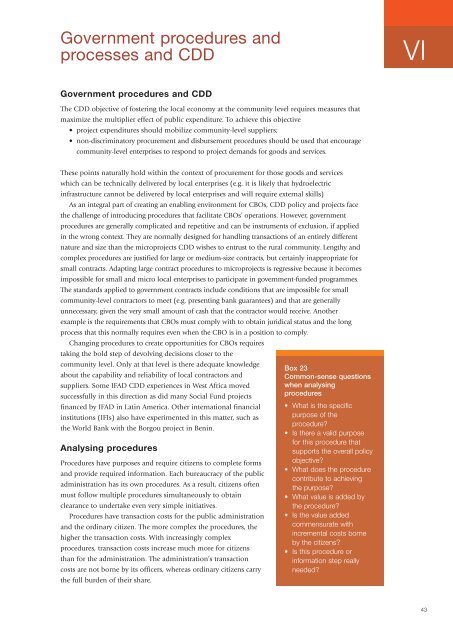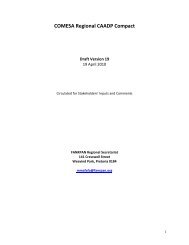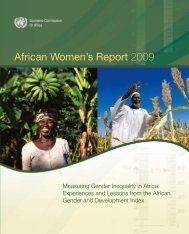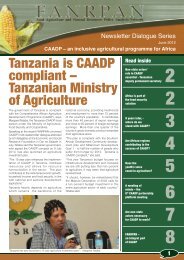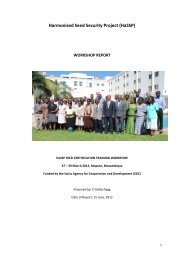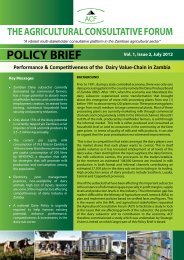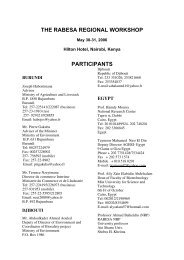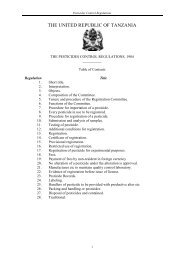Community-driven development decision tools for rural - IFAD
Community-driven development decision tools for rural - IFAD
Community-driven development decision tools for rural - IFAD
- No tags were found...
Create successful ePaper yourself
Turn your PDF publications into a flip-book with our unique Google optimized e-Paper software.
Government procedures andprocesses and CDDVIGovernment procedures and CDDThe CDD objective of fostering the local economy at the community level requires measures thatmaximize the multiplier effect of public expenditure. To achieve this objective• project expenditures should mobilize community-level suppliers;• non-discriminatory procurement and disbursement procedures should be used that encouragecommunity-level enterprises to respond to project demands <strong>for</strong> goods and services.These points naturally hold within the context of procurement <strong>for</strong> those goods and serviceswhich can be technically delivered by local enterprises (e.g. it is likely that hydroelectricinfrastructure cannot be delivered by local enterprises and will require external skills)As an integral part of creating an enabling environment <strong>for</strong> CBOs, CDD policy and projects facethe challenge of introducing procedures that facilitate CBOs’ operations. However, governmentprocedures are generally complicated and repetitive and can be instruments of exclusion, if appliedin the wrong context. They are normally designed <strong>for</strong> handling transactions of an entirely differentnature and size than the microprojects CDD wishes to entrust to the <strong>rural</strong> community. Lengthy andcomplex procedures are justified <strong>for</strong> large or medium-size contracts, but certainly inappropriate <strong>for</strong>small contracts. Adapting large contract procedures to microprojects is regressive because it becomesimpossible <strong>for</strong> small and micro local enterprises to participate in government-funded programmes.The standards applied to government contracts include conditions that are impossible <strong>for</strong> smallcommunity-level contractors to meet (e.g. presenting bank guarantees) and that are generallyunnecessary, given the very small amount of cash that the contractor would receive. Anotherexample is the requirements that CBOs must comply with to obtain juridical status and the longprocess that this normally requires even when the CBO is in a position to comply.Changing procedures to create opportunities <strong>for</strong> CBOs requirestaking the bold step of devolving <strong>decision</strong>s closer to thecommunity level. Only at that level is there adequate knowledgeBox 23about the capability and reliability of local contractors andCommon-sense questionssuppliers. Some <strong>IFAD</strong> CDD experiences in West Africa moved when analysingsuccessfully in this direction as did many Social Fund projectsproceduresfinanced by <strong>IFAD</strong> in Latin America. Other international financial • What is the specificinstitutions (IFIs) also have experimented in this matter, such as purpose of theprocedure?the World Bank with the Borgou project in Benin.• Is there a valid purpose<strong>for</strong> this procedure thatAnalysing proceduressupports the overall policyProcedures have purposes and require citizens to complete <strong>for</strong>ms objective?• What does the procedureand provide required in<strong>for</strong>mation. Each bureaucracy of the publiccontribute to achievingadministration has its own procedures. As a result, citizens oftenthe purpose?must follow multiple procedures simultaneously to obtain• What value is added byclearance to undertake even very simple initiatives.the procedure?Procedures have transaction costs <strong>for</strong> the public administration • Is the value addedand the ordinary citizen. The more complex the procedures, the commensurate withincremental costs bornehigher the transaction costs. With increasingly complexby the citizens?procedures, transaction costs increase much more <strong>for</strong> citizens• Is this procedure orthan <strong>for</strong> the administration. The administration’s transactionin<strong>for</strong>mation step reallycosts are not borne by its officers, whereas ordinary citizens carry needed?the full burden of their share.43


